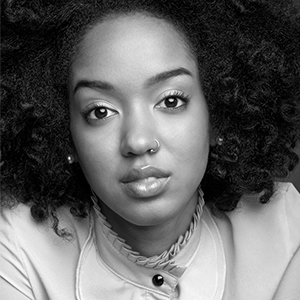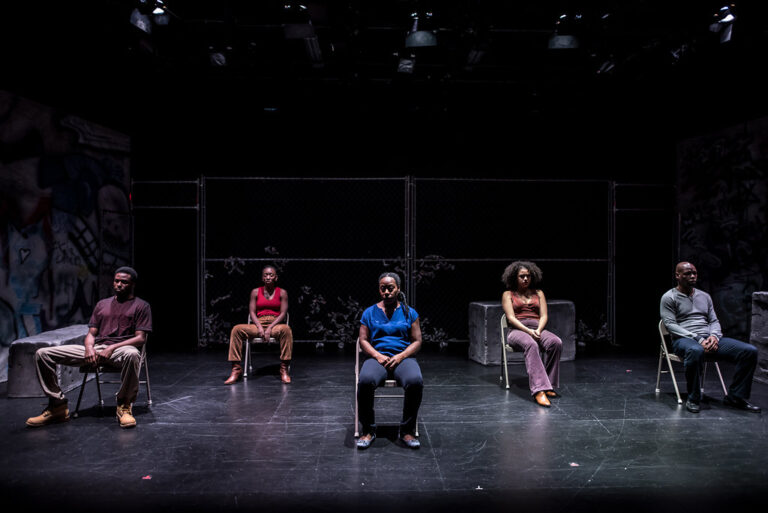The Poet, the DJ, and the Stage
Motion: the prolific poet, playwright, and rapper who has perfected the delicate balance of being meticulous yet masterful with her words. L’Oqenz: the legendary deejay and sound designer who develops intricate soundscapes and crafts magic on the turntables. Their friendship is one that has spanned decades and in that time has produced a remarkable amount of creative output.
On October 4th their production Oraltorio: A Theatrical Mixtape opens in Toronto. Oraltorio is an epic aural adventure into the history of sound in the African Diaspora told through the voices of Black women. “From the griot storyteller to the Afrofuturistic digital voice, the dancehall queens to the blues women and the jazz singers to the disco divas,” is how Motion broke it down for me when I spoke to Motion and L’Oqenz on the phone last week following their tech rehearsal. “Women whose voices have basically connected through the history of sound and the power of sound in our lives,” Motion added before L’Oqenz offered an amendment to the timeframe they are considering in the show, “In our lifetimes. In our many and plenty of lifetimes.” The two share the stage, Motion as b-girl and L’Oqenz as deejay, working fluidly as a two-person unit to tell this expansive story.
Oraltorio is an attempt to disrupt the conventional assumptions of whose voices are centred and amplified. Generally, epic tales of history have been told from the vantage point of men, and more specifically white men. But one of the stated goals of Oraltorio according to Motion is to “open up the space and hear more.” It’s a principle that has guided much of their work as collaborators and as individuals. And it’s a thesis that finds its genesis in their own epic tale of friendship.

Photo by Daniel Malavasi
As I listened to them go back and forth, piecing together memories, I was moved (not for the first time) by the deep and unabashed love these two women have for each other. Unafraid to celebrate each other’s talents and wins, Motion and L’Oqenz seem to be each others’ biggest fans; a marked contrast to the narrative that often dominates tales of women in Hip Hop as foes and competitors. “We just naturally support each other because we know that we actually need each other,” L’Oqenz explained to me. “There was a genuine sisterhood that was formed. I think we both have compassion for where each other is at at any given time. If I’m being a curmudgeon than Motion is compassionate towards that. Thank God for that.” Motion giggled before saying “and vice versa.”
I’m fascinated by a sisterhood that has birthed a production dedicated to centering and hearing the voices of women across history and so I decided to find out more about the journey that led to this project. I soon realized that the friendship between Motion and DJ L’Oqenz would be a beautiful premise for a theatrical musical, each act punctuated by a different aural environment.
Act One: The Protest
Neither Motion nor L’Oqenz remember when they first met. They’ve known each other for so long that they cannot recall a time when they weren’t a presence in each other’s lives. But both agree that the first meeting probably occurred not at daycare or a park playground but rather during a protest or political meeting. This may seem an odd site for a first introduction between children, but in the world that Motion and L’Oqenz were raised in, this was their norm.
Decades before Black Lives Matter became front page news, their parents protested and called out institutions for their racism and bias, laying the foundation for the activism of today. Their parents were members of numerous groups including the Organization of Parents of Black Children. “They did a lot of advocacy for Black students in the city,” Motion told me. “[They] helped to get the Black cultural heritage programs running in schools [and] would go with parents to advocate for their children who were being targeted or streamed.” Both Motion and L’Oqenz spoke with a deep respect for the work of that generation and an eagerness to give credit to people and movements that are rarely recognized and often forgotten. Raised in an environment where people did not wait for permission, it is no wonder that the two move through the world with the implicit knowledge that if the story is not being told, then it is their job to tell it.

Photo by Daniel Malavasi
Act Two: The Airwaves
Motion and L’Oqenz may not recall their first meeting, but they do remember their first true connection. It occurred against the backdrop of their shared love for an emerging artistic movement known as Hip Hop. This was an era when it took real work to be a fan of a musical form ignored by most radio stations and long before Wu-Tang could be heard in burrito joints on Queen Street West. While commercial radio stations played Bryan Adams and the Barenaked Ladies, community radio was where rap fans went to hear Dream Warriors, Tara Chase and Saukrates. As a result, community radio was a revered cultural institution; and it was the place where some of the most legendary deejays in the city got their chops.
long before Wu-Tang could be heard in burrito joints on Queen Street West
The Masterplan Show is credited for developing the careers of some of the most lauded names in Canadian Hip Hop including Motion and L’Oqenz. “I grew up listening to The Masterplan show,” L’Oqenz said. “[Motion’s] voice on that show was so important to hear. You know it was the strong Black woman speaking, holding her own in a very male dominated space. I remember being called into The Masterplan Show and working alongside DTS when Motion wasn’t there and DTS very intentionally being like you and Motion have to work together.”
L’Oqenz and Motion were both part of a cultural milieu that encouraged a celebration of the intellectual music nerd, the person who went the extra mile to dig through the crates, understand the samples, and recognize the layers of production. “There’s a certain level of musical knowledge, a musicology that you just get used to,” Motion recalled. “[L’Oqenz] was like that, that was her background, that was her lineage.” That commitment to research has come in handy for Oraltorio, a production that required a deep dive into musical history and an ability to draw connections between people, politics, sound, and eras. The process has been a more than decade long endeavour.
Act Three: The Stage
Motion rocked the mic and L’Oqenz ruled the turntables. It was only a matter of time before the two decided to join forces. It was Motion who made the call to L’Oqenz asking if she would be interested in being her deejay when she performed. “That’s where the chemistry was brewed,” L’Oqenz said. As they traveled to cities like Montreal and Ottawa, they began exploring different ways to amplify Motion’s poetry, creating a new type of magic each time they shared the stage. “The way she was able to pull soundbites and make like a score for a spoken word piece? It was just on,” Motion told me. “She was a deejay but she was a producer. She was a composer. We would come up with dope samples and weird cuts for freestyles. We had our language that we could communicate with each other.” This is where the groundwork truly began for Oraltorio. Motion is the wordsmith and performer, embodying numerous characters, calling upon an array of eras as she travels through time. L’Oqenz is the “one-woman orchestra.” Motion breaks down her role like this: “She’s piecing together her own musical thesis, her own compositions are interwoven throughout the story. It’s polyphonic.”
Oraltorio has become for Motion and L’Oqenz, the full circle moment in a friendship rooted in respect for the holy trinity of beats, rhymes, and life. They are a two-woman powerhouse, tag-teaming each other into the ring, each round displaying a new layer in both their skills and their understanding. Throughout it all, they have carried these sacred tools with them: a history of protest, a deep grounding in Hip Hop, a reverence for the stage and perhaps most importantly a gentle yet enduring love for each other. It’s truly inspiring. I can’t wait to see what Act 4 will bring.
Amanda Parris starred as Aneemah in Motion’s award-winning play Aneemah’s Spot.











Comments